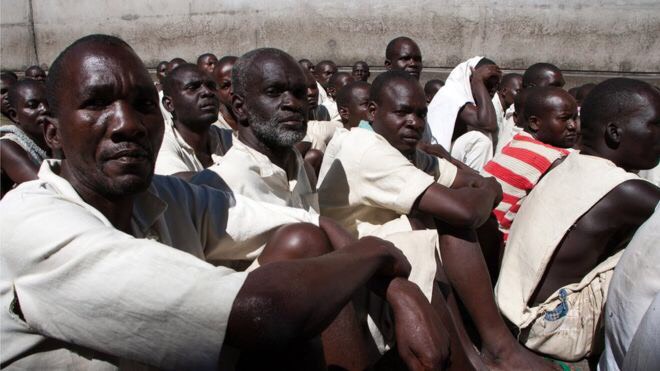- About
- Topics
- Picks
- Audio
- Story
- In-Depth
- Opinion
- News
- Donate
- Signup for our newsletterOur Editors' Best Picks.Send
Read, Debate: Engage.
| March 01, 2023 | |
|---|---|
| topic: | Death Penalty |
| tags: | #death penalty, #Zambia, #Africa, #capital punishment |
| located: | Zambia |
| by: | Cyril Zenda |
Zambia has become the latest African nation to abolish the death penalty, a culmination of years of lobbying by local, regional and global human rights groups. The move, which fulfils one of President Hakainde Hichilema’s election promises, has been hailed as a step in the right direction.
"Amnesty International welcomes the announcement by President Hichilema that the death penalty has been abolished in Zambia," Tigere Chagutah, Amnesty International’s regional director for East and Southern Africa said. "This is a good and progressive move that shows the country’s commitment to protecting the right to life."
Chagutah noted that with the abolition, Zambia had become the 25th country in sub-Saharan Africa to abolish the death penalty for all crimes.
"Zambia’s decision to ban the death penalty should serve as an example to countries in the region that still use the death penalty and compel them to take immediate steps to end this cruel, inhuman and degrading form of punishment and protect the right to life."
The watchdog also commended President Hichilema for quashing the offence of criminal defamation of the president, a repressive law that had hitherto been used to muzzle free speech and unjustifiably limit freedom of expression in the country.
The United Nations, on its part, hailed the development as a "historic milestone."
President Hichilema took office in August 2021, and in May 2022 his government announced that it was working with parliament to abolish capital punishment in the country. The process culminated with his adoption of the amendments that abolished the colonial-era law.
Repeatedly arrested during his days in the opposition - including on treason charges that then attracted the capital punishment - Hichilema spent extended periods of time in Zambian jails, including at Mukobeko Maximum Security Prison, where death row inmates are locked up - a harrowing experience that gave him an understanding of the dire conditions in the prisons.
It was this experience that compelled Hichilema to promise to reform the system.
To consummate the abolishment, in mid-February President Hichilema commuted the death sentences of the 390 death row inmates - 379 males and 11 females - to life imprisonment. The prisoners may also benefit from future presidential pardons.
The 390 were crammed in a section of Mukobeko Prison that was originally designed to accommodate only 48 inmates.
The Prisons Care and Counselling Association (PRISCCA), a non-governmental organisation that for years campaigned for prisoners' rights and the abolition of the death penalty in Zambia, is pleased that one of its goals has since been realised.
PRISCCA executive director Godfrey Malembeka, who witnessed the last hanging in Mukobeko Maximum Security Prison in 1997 - which prompting him and others to form the association, said the development was a 'dream come true' for him.
"As a former prisoner and PRISCCA manager, we are extremely humbled, happy and encouraged after our non stop advocacy for the past 23 years," Malembeka told FairPlanet.
"The prisons and Zambian human rights profile have gone up after the death penalty abolition."
Malembeka said PRISCCA’s advocacy for the improvement of the welfare of inmates in Zambia, especially their human rights entitlements, would contribute to the national development before and after their discharge.
"Lifers are more productive than condemned prisoners. The death penalty abolition will speed up the actualisation of the paradigm shift [from prisons - a punitive model - to a correctional model] in our new law, Correctional Act No. 37, which emphasises rehabilitation," he added. "It was impossible to correct a dead person if death penalty was maintained."
The abolition of the death penalty is the latest success to come their way, having also managed to secure voting rights for prisoners in Zambia.
But Malembeka said a lot more still needs to be done to improve Zambia's justice system and the general condition in the country’s prisons.
"Our major remaining advocacy issues, among many, will be on: Re-instating progressive ex-prisoners into government; better re-integration of ex-prisoners; speedy and inclusive access to justice for all; scaling up diversion [decentralisation] services to all provinces; scaling up the use of non-custodial sentences or options; actualising and operationalising of the paradigm shift; adequate provision of special basic needs to Circumstantial Children (those born and brought in prison by their mothers)."
The PRISCCA executive director highlighted that Zambia’s 90 prisons have a population of more than 24,000, against their combined holding capacity of just 9,600. He said that of these, between 3,000 and 4,000 of these inmates are remandees, persons awaiting trial, victims of the country’s slow and inefficient justice delivery system.
A total of 111 countries in the world have abolished the death penalty for all crimes. Nearly half the independent states in Africa - 26 out of 54 states - have abolished the death penalty.
Of the remainder, 13 are retentionists in both law and practice, while the other 15 are abolitionist in practice, meaning they have not executed anyone for at least 10 years. Globally, about 50 countries are still retentionist, but this figure continues to dwindle.
In its 2022 report on the use of the death penalty, Amnesty International indicated that executions in sub-Saharan Africa more than doubled from 16 in 2020 to 33 in 2021.
These executions were carried out in three countries: Botswana, Egypt, South Sudan, Sudan and Somalia. Botswana remains the only retentionist state country in southern Africa, while Angola, Malawi, Mauritius, Mozambique, Namibia, Seychelles, and South Africa have all abolished the death penalty.
Image by Grant Durr
By copying the embed code below, you agree to adhere to our republishing guidelines.
